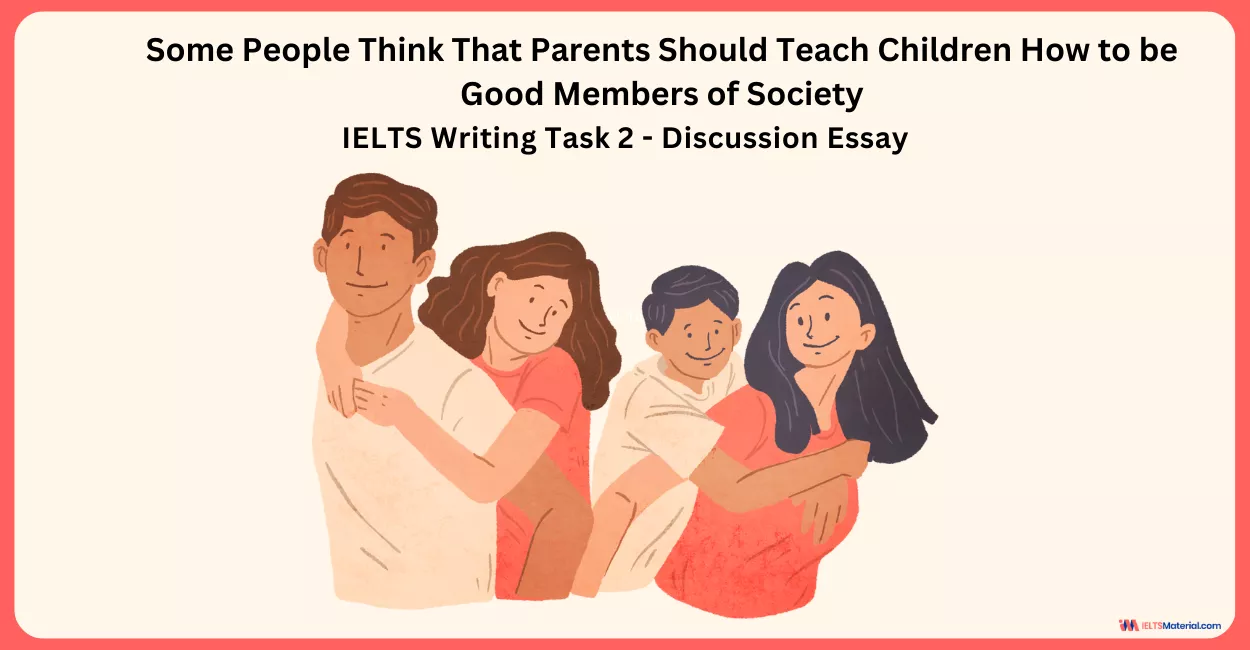What are the Advantages and Disadvantages of Studying Abroad- IELTS Writing Task 2
Aiming for a Band 9 in IELTS Writing? Get expert-crafted sample answers on "What are the Advantages and Disadvantages of Studying Abroad", featuring well-structured arguments, high-level vocabulary, and effective essay strategies.
Table of Contents
- Question
- Advantages and Disadvantages of Studying Abroad – Band 7 Sample Answer
- Advantages and Disadvantages of Studying Abroad – Band 8 Sample Answer
- Advantages and Disadvantages of Studying Abroad – Band 9 Sample Answer
- Connectors Used in the Above Sample Answers of Advantages and Disadvantages of Studying Abroad

Try AI Essay Checker for Instant Band Score
Achieving proficiency in the IELTS Writing Task 2 poses a difficulty for numerous test-takers as it assesses your ability to write a well-structured and cohesive essay in response to a given topic. Hence, it is essential to enhance your essay writing abilities before undertaking the IELTS to ensure success. 'Advantages and Disadvantages of Studying Abroad' is an Advantages and Disadvantages essay that assesses a writer’s ability to evaluate both the positive and negative aspects of a particular issue. To effectively prepare for the IELTS Writing Task 2, it is highly recommended to practice with a variety of sample essays.
Question
You should spend about 40 minutes on this task.
What are the advantages and disadvantages of studying abroad?
Give reasons for your answer and include any relevant examples from your own knowledge or experience.
You should write at least 250 words.
Structure Breakdown
| Essay
Introduction
Body paragraph 1
Body paragraph 2
Conclusion
|
Advantages and Disadvantages of Studying Abroad – Band 7 Sample Answer
Introduction:
Studying abroad has become much more prevalent in this current day and age than it was before. Today, nearly every student considers studying abroad for higher education, especially for their Master’s degree. Since travelling to a foreign country has become relatively straightforward, people are availing themselves of the best of opportunities. However, there are both pros and cons to studying abroad, making it a challenging decision to take. In the following paragraphs, I will go through the advantages and disadvantages of studying abroad.
Body Paragraph 1:
The present-day economy is known to be competitive and demanding. Today, if an individual is not decorated with impressive degrees and accolades, they are bound to miss out on various profitable opportunities. Amidst such relentless competition, an individual will inevitably choose to be educated at a reputable academic institution. Since the quality of education is often not superlative in developing countries, people from such nations tend to move abroad for better alternatives. Also, the amount of time a student spends studying abroad and adapting to the foreign environment significantly increases their interpersonal skills and facilitates their overall development.
Body Paragraph 2:
On the contrary, there are numerous limitations to choosing a foreign university for higher education. First and foremost, we must acknowledge that studying and living abroad is an exceedingly costly affair. Most students have to give up on their ambition of studying abroad due to financial hindrances. Moreover, staying away from one’s family and native place is an onerous ordeal. There are also several cases of discrimination and social exclusion against non-native students, which makes it difficult for such individuals to adopt the lifestyle of the host country.
Conclusion:
Finally, I would like to end by saying that, like any other course of action, studying abroad has both benefits and drawbacks. It is upon the individual who needs to weigh their options and make a prudent decision.
Band 7 Vocabulary for Advantages and Disadvantages of Studying Abroad
Now check out some relevant vocabulary used in the above Band 7 IELTS Writing Task 2 sample essay on advantages and disadvantages of studying abroad.
- Prevalent
Meaning: widespread in a particular area or at a particular time.
Example: There are many social obstacles still prevalent in today’s society.
- Challenging
Meaning: testing one’s abilities; demanding.
Example: The journey was lengthy and challenging.
- Accolades
Meaning: an award or privilege granted as a special honour or as an acknowledgement of merit.
Example: The army officer was presented with numerous accolades.
- Superlative
Meaning: of the highest quality or degree.
Example: She possessed a superlative skill in dancing.
- Exceedingly
Meaning: extremely.
Example: The Taj Mahal is an exceedingly beautiful monument.
- Hindrances
Meaning: a thing that provides resistance, delay, or obstruction to something or someone.
Example: There were many hindrances during the execution of the plan.
- Onerous
Meaning: (of a task or responsibility) involving a great deal of effort, trouble, or difficulty.
Example: The duty of raising a child is an onerous task.
- Prudent
Meaning: acting with or showing care and thought for the future.
Example: He made a prudent decision in the end.
Looking for more IELTS Writing Task 2 topics ? Get Our Exclusive IELTS Writing Task 2 Books Now!
Advantages and Disadvantages of Studying Abroad – Band 8 Sample Answer
Introduction:
Studying abroad has become increasingly popular in recent years, with students from all over the world opting to pursue their higher education in foreign countries. There are many advantages to studying abroad, including a better learning experience, international exposure, and enhanced employment opportunities. However, there are also some disadvantages to consider, such as the high cost of living and education, the challenges of adapting to a new culture, and the potential for homesickness.
Body Paragraph 1:
One of the biggest advantages of studying abroad is that it provides students with a better learning experience. Foreign universities often offer more specialized programs and cutting-edge research facilities than their domestic counterparts. Additionally, students are able to learn from world-renowned professors and interact with classmates from diverse backgrounds. This can lead to a more well-rounded education and a deeper understanding of the world.
For example, students who study engineering at a top university in Germany may have access to state-of-the-art laboratories and equipment, as well as the opportunity to work on research projects with leading experts in the field. Similarly, students who study business at a prestigious university in the United States may have the chance to learn from experienced entrepreneurs and business leaders.
Body Paragraph 2:
Another advantage of studying abroad is that it exposes students to new cultures and perspectives. This can help them to become more open-minded and tolerant individuals. It can also give them a competitive edge in the global job market, as employers increasingly value candidates with international experience.
For example, a student who studies abroad in Japan may learn about Japanese culture and values, such as the importance of hard work and respect for elders. This knowledge can be invaluable when applying for jobs in Japanese companies. Similarly, a student who studies abroad in France may learn about French business culture and etiquette. This can be helpful when working with French clients or colleagues.
Body Paragraph 3:
Finally, studying abroad can enhance students’ employment opportunities. Many employers are looking for candidates with international experience and intercultural skills. Students who have studied abroad can demonstrate these skills through their resumes, cover letters, and job interviews.
For example, a student who has studied abroad in China may have the opportunity to work for a Chinese multinational company. A student who has studied abroad in India may be able to land a job in a tech company in Bangalore. In both cases, the student’s international experience will give them an advantage over other candidates.
Conclusion:
Overall, the advantages of studying abroad outweigh the disadvantages. While the cost of studying abroad can be high, there are many scholarships and financial aid options available. Additionally, the challenges of adapting to a new culture can be overcome with careful planning and preparation. For students who are willing to put in the effort, studying abroad can be a life-changing experience.
Band 8 Vocabulary for Advantages and Disadvantages of Studying Abroad
Have a look at the IELTS Vocabulary for Band 8 sample answer on 'Advantages and Disadvantages of Studying Abroad'.
- Opting (verb)
Meaning: choosing, selecting.
Example: Students from various countries are opting to study abroad for a more comprehensive educational experience.
- Cutting-edge (adjective)
Meaning: innovative, advanced.
Example: Foreign universities often provide students with access to cutting-edge technology and research facilities.
- Well-rounded (adjective)
Meaning: comprehensive, balanced.
Example: Interacting with diverse classmates contributes to a student’s well-rounded educational experience.
- Invaluable (adjective)
Meaning: extremely useful or valuable.
Example: The knowledge of local culture and customs can be invaluable for students seeking employment in foreign countries.
- Etiquette (noun)
Meaning: the customary code of polite behavior in society or among members of a particular profession or group.
Example: Understanding French business etiquette can be crucial for effective communication in a professional setting.
- Multinational (adjective)
Meaning: involving or operating in several nations or countries.
Example: Students with international experience have an edge when applying to multinational companies.
- Life-changing (adjective)
Meaning: having such a strong effect that it changes one’s life.
Example: For many students, the experience of studying abroad is truly life-changing, shaping their perspectives and future opportunities.
Want to know the secret to writing a high-scoring IELTS Writing Task 2 essay? Book a session with an IELTS expert today and find out!
Advantages and Disadvantages of Studying Abroad – Band 9 Sample Answer
Unlock Explanations
If you want to have a look at the band 9 sample answer, sign up!
Introduction:
The landscape of international education has expanded significantly, attracting a growing number of students pursuing higher degrees abroad. While studying abroad offers diverse cultural exposure and personal development, it comes with financial and socio-cultural challenges. This essay contends that the advantages, such as enhanced career prospects and personal growth, are balanced by significant disadvantages, including financial burdens and potential difficulties in adapting to new environments.
Body Paragraph 1:
One major advantage of studying abroad is the unparalleled exposure to superior educational opportunities. As competition intensifies globally, students seek admission to prestigious institutions, aiming for degrees from renowned universities. This exposure not only broadens their academic horizons but also positions them for better career opportunities. For instance, students often lack access to state-of-the-art facilities in their home countries, compelling them to explore education abroad.
Body Paragraph 2:
Conversely, a noteworthy disadvantage is the financial strain associated with studying overseas. The costs involved, encompassing tuition fees and travel expenditures, pose a significant barrier for many students. Consequently, dreams and aspirations may be surrendered due to the inability to manage these expenses. The financial burden extends to the challenges of relocating far from home, creating additional hurdles for those unfamiliar with such separation.
Conclusion:
In conclusion, the decision to study abroad entails a careful consideration of its advantages and disadvantages. While the exposure to diverse cultures and superior education is advantageous, the financial and socio-cultural challenges cannot be overlooked. Prospective students must weigh these factors diligently to make informed decisions aligned with their academic and personal goals. Ultimately, the benefits and drawbacks are intrinsic to the pursuit of international education, demanding thoughtful reflection before embarking on this transformative journey.
Band 9 Vocabulary for Advantages and Disadvantages of Studying Abroad
Use the following Band 9 vocabulary while writing your essay on 'Advantages and Disadvantages of Studying Abroad' and improve your IELTS band score.
- Consequential (adjective):
Meaning: Resulting from or having important consequences.
Example: The decision to study abroad is consequential, impacting both academic and personal aspects of a student’s life.
- Landscape (noun):
Meaning: The overall look or view of a particular subject or situation.
Example: The educational landscape has evolved, with more students considering international studies.
- Prestigious (adjective):
Meaning: Having a high reputation or honor.
Example: Students aspire to gain admission to prestigious institutions for a quality education.
- Horizons (noun):
Meaning: The range of one’s knowledge, experience, or interest.
Example: Studying abroad broadens students’ academic horizons, exposing them to diverse subjects and cultures.
- Intrinsic (adjective):
Meaning: Belonging naturally; essential.
Example: The benefits and drawbacks are intrinsic to the pursuit of international education.
- Conducive (adjective):
Meaning: Making a certain situation or outcome likely or possible.
Example: The exposure to diverse cultures is conducive to personal development.
- Harbor (verb):
Meaning: To shelter or provide a home for.
Example: Students may harbor concerns about adapting to new environments when studying abroad.
- Reiterate (verb):
Meaning: To say or do something again, usually for emphasis.
Example: In the conclusion, the essay reiterates the importance of weighing the advantages and disadvantages before making a decision.
If you want to practise regularly, check out the IELTS Writing practice tests!
Connectors Used in the Above Sample Answers of Advantages and Disadvantages of Studying Abroad
Connectors, also known as connectives or transition words, are words or phrases that link ideas or parts of a sentence or paragraph together. Here are some of the connectors and linking words for writing used in the above sample answers:
- While
- For instance
- Conversely
- Consequently
- In conclusion
- However
- For example
- Overall
Now that you have gone through the sample answers on the topic – Advantages and Disadvantages of Studying Abroad – it is time for you to try writing on your own. For that, leave your answers as a comment below or you can use our Free IELTS Writing Essay Evaluation and Correction Service!
Also Check
- How to Plan an IELTS Opinion Essay?
- Best IELTS Writing Task 2 Tips for Achieving Band 9
- The Global Demand for Oil and Gas is Increasing
- The Best Way to Improve Health is to Exercise Daily
- The Prevention of Health Problems and Health Illness is More Important than Treatment and Medicine
- Some Companies Sponsor Sport and Sports Stars as a Way to Advertise Themselves
Practice IELTS Writing Task 2 based on Essay types

Start Preparing for IELTS: Get Your 10-Day Study Plan Today!
Explore other Advantage Disadvantage Essays



Recent Articles

Haniya Yashfeen


Prity Mallick

Kasturika Samanta





Post your Comments